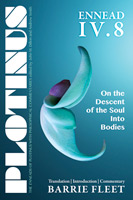
 |
PLOTINUS Ennead IV.8:
On the Descent of
the Soul Into Bodies
Translation, with an Introduction, and Commentary
THE ENNEADS OF PLOTINUS
—WITH PHILOSOPHICAL COMMENTARIES
Series Edited by
John M. Dillon and Andrew Smith
June 2012
ISBN: 978-1-930972-77-3
220 pages • 5 x 7.5 • Paperback
$37.00
|
|

Barrie Fleet
is affiliated Lecturer and former Fellow and Director of Studies in Classics at Corpus Christi College, University of Cambridge, UK. He is the author of Plotinus: Ennead III.6 On the Impassivity of the Bodiless. Text with a Translation and Commentary (Oxford, 1995), and three volumes in the Ancient Commentators on Aristotle series edited by Richard Sorabji (Cornell/Duckworth): Simplicius: On Aristotle Physics 2 (1997), Simplicius: On Aristotle Categories 5 & 6, with Frans de Haas, (2001), and Simplicius: On Aristotle Categories 7 & 8 (2002). He also made a substantial contribution to The Philosophy of the Commentators, 200–600 AD: A Sourcebook (ed. Richard Sorabji, Duckworth 2004). |
|
|
Plotinus was much exercised by Plato's doctrines of the soul. In this treatise, at chapter 1 line 27, he talks of "the divine Plato, who has said in many places in his works many noble things about the soul and its arrival here, so that we can hope for some clarity from him. So what does the philosopher say? It is clear that he does not always speak with sufficient consistency for us to make out his intentions with any ease." The issue in this treatise is one that has puzzled students of Plato from ancient to modern times—and is indeed a popular topic for undergraduate essays even today: Why should the philosopher, who has ascended through a long and painful process of dialectic to "assimilation to the divine," ever descend back into the body? Plotinus himself is said by Porphyry to have attained such a state of other-worldly transcendence on at least four occasions during his lifetime, so this was a very real and personal issue for him. In this treatise we see him grappling with it.
Plotinus was a Platonist, committed to expounding the doctrines put forward by Plato some seven centuries earlier. He was born and educated in Egypt, where he studied the teachings of Plato under the guidance of Ammonius Saccas. He came to Rome in 244 CE and built up a circle of followers devoted to studying Plato through Plato's own works and those of philosophers, both Platonist and non-Platonist, of the intervening centuries. From his fiftieth year Plotinus himself wrote down, in Greek, the findings of the seminars, and these writings were later edited by one of his pupils, Porphyry, and published in six groups of nine treatises entitled the Enneads (from the Greek word for nine – ennea).
|
|
 |
Parmenides Publishing is bringing out the Enneads with critical commentaries in handy pocket installments. This is the key treatise IV. 8, which raises the central and most crucial tension in Platonic exegesis: which tendency will prevail, the doctrine deriving from the allegory of the sun, that the Good is naturally self-diffusive and seeks to spread or communicate itself, or the equally Platonic doctrine, derivative from the cave as an allegory for philosophic education and liberation, that the higher is properly self-preoccupied and never stoops or inclines toward the lower; rather, it is for the lower to ‘convert’ and rise, through arduous purification and gradual perfection, to make contact with and eventually fuse with the higher?
(Read the entire review here) |
—Patrick Madigan
Heythrop Journal |
|
|
The International Journal of the Platonic Tradition |
Plotinus’ Enneads have known chequered fortunes in the last hundred and fifty years. Although excellent critical editions and in-depth studies of individual tractates have appeared in French and German, the philosophy of the Enneads has tended to suffer from prejudicial and adverse judgment on the part of analytically-minded Anglo-American philosophers. It is all the more encouraging therefore to note that, thanks to the efforts of British and North American classicists and philosophers prepared to swim against the current, the Enneads are at long last enjoying a revival of interest in the tradition that had so far spurned them. Of this revival, Barrie Fleet’s translation and commentary of Ennead IV.8 is a welcome sign. It is the first volume in a new series, directed by John Dillon and Andrew Smith, which aims at providing new translations and running commentaries of Plotinian tractates.
(Read the entire review here) |
—Suzanne Stern-Gillet
University of Bolton and University of Manchester |
|
This is one of the first in a series of translations and commentaries of Plotinus’
treatises in the Enneads. The series will be invaluable to scholars and students
who want accuracy in translation, an explanation of Plotinus’ argument, and his
relation to his sources, especially Plato, Aristotle, and a host of other figures in
the Greek and Hellenistic tradition. The Introduction presents a concise orientation
for reading the treatise ‘On the Descent of the Soul into Bodies’ by indicating
the problems that exercised Plotinus in writing about the soul, especially in
the complex way soul relates to different kinds of bodies in the sensible world.
Fleet skips over Plotinus’ comments on Heraclitus and Empedocles (treating
them more extensively in the commentary) and moves directly to the Platonic
background. This highlights both Plotinus’ commitment to following Plato and
his willingness to admit the lack of clarity, especially the inconsistencies about
the nature of the soul that haunt the Platonic text.
(Read the entire review here) |
—Gary M. Gurtler, S.J.
Department of Philosophy
Boston College,
Chestnut Hill MA |
|
 |
This is the first volume of a new series of translations and commentaries on the individual treatises of Plotinus' Enneads, edited by John Dillon and Andrew Smith. This series is the first of its kind in English, and thus constitutes a major contribution to English language scholarship on Plotinus and late ancient philosophy. Similar to the French series published by Les Éditions du Cerf, this series provides detailed discussions of individual treatises. The present volume consists of an introduction to the series by the editors, and an introduction, translation, and commentary of Ennead IV. 8 by Barrie Fleet.
(Read the entire review here) |
—D.M. Hutchinson
St. Olaf College |
|
"This volume makes an excellent start to the series. Barrie Fleet's translation is both accurate and readable. His scholarly and well-informed commentary is particularly valuable in demonstrating how Plotinus' views on the soul arise from the interpretation of Plato."
|
—Anne Sheppard
Professor of Ancient Philosophy
Royal Holloway, University of London, UK |
|
 |
| "The first volume of a new series of translations and commentaries, edited by John Dillon and Andrew Smith, is devoted to Enn IV.8. We are in the capable hands of Barrie Fleet, author of an important previous study on Enn III.6. . . .Fleet's introduction to the treatise and his commentary will be especially helpful to readers coming to Plotinus for the first time . . . .[He] provides extensive discussion of the Platonic passages that inspired Plotinus; an approach that fits IV.8 especially well, since this treatise is unusually explicit in its doxographical use of Plato. Overall the volume is a promising beginning to a new series that will provide an English readership with something akin to the single-treatise commentaries and translations published by Cerf in France." |
—Peter Adamson
Professor of Ancient and Medieval Philosophy
King's College London, UK |
|
| "Enn. IV 8 is one of Plotinus' most fascinating essays. It begins by addressing what for ancient Platonism was a very traditional topic, namely the descent of the soul, and examines it in the light of his own personal experience, while also taking into account the doctrines of previous thinkers including Plato and Aristotle. It concludes by expounding a radically novel view according to which no real descent occurs after all. This involves a fundamental reassessment of the status of the soul and its position in the universe and, furthermore, a new understanding of its association with the body and with sensible reality as a whole. Fleet's presentation is highly readable and informative, and provides an excellent introduction to Plotinus' views on man and his relation to the cosmos." |
—Paul Kalligas
Professor of Ancient Philosophy
University of Athens, Greece |
|
| "A clear and accurate translation of one of Plotinus' first and more significant writings, accompanied by a helpful commentary for the English-speaking reader." |
—Dominic O'Meara
Professor Emeritus
Chair of Metaphysics and Ancient Philosophy
University of Fribourg, Switzerland |
|
|
|
|
|

